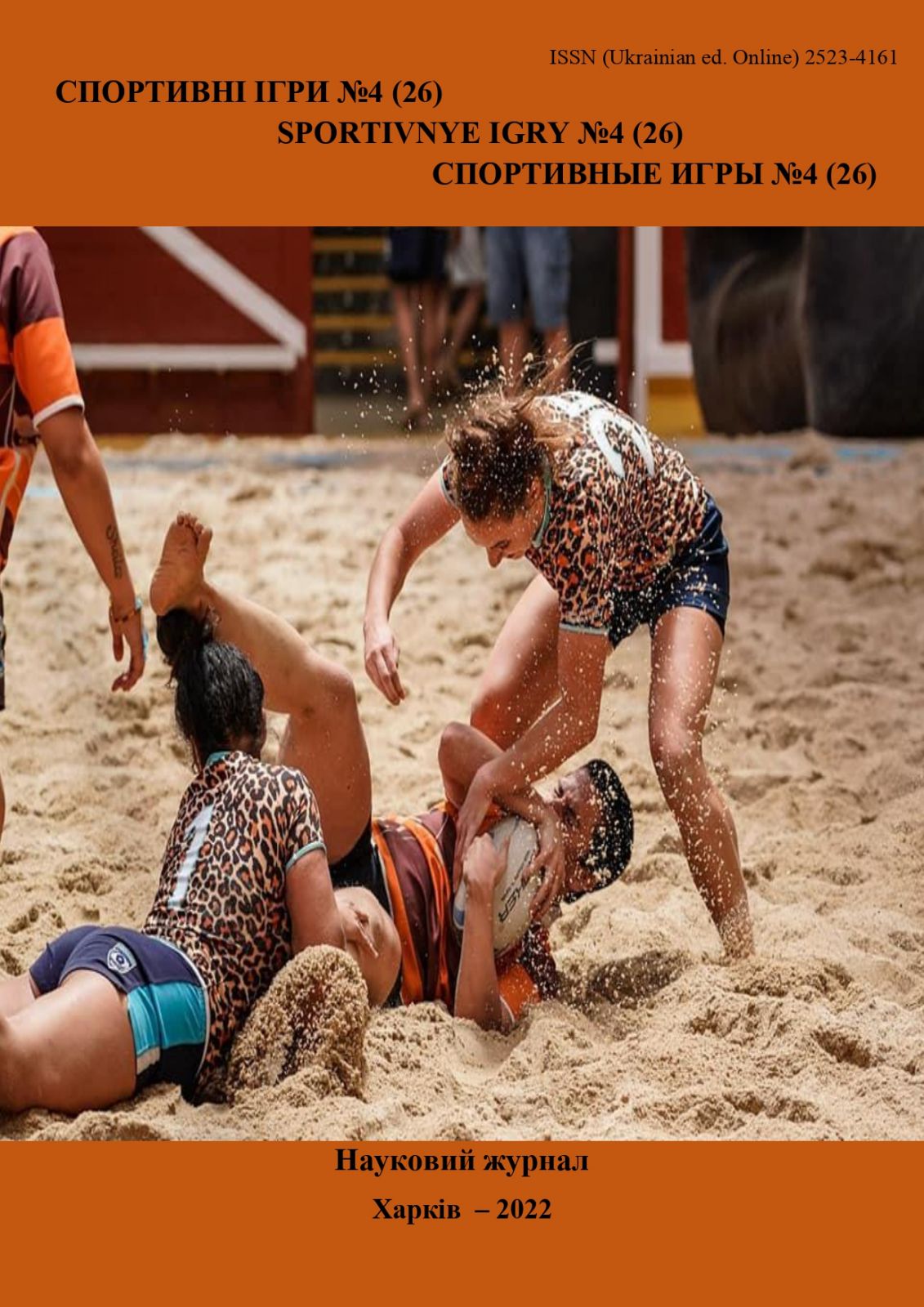Перспективи удосконалення фізичного виховання дітей дошкільного віку засобами спортивних ігор
DOI:
https://doi.org/10.15391/si.2022-4.03Ключові слова:
спортивні ігри, фізичне виховання, дошкільний вікАнотація
Важливим напрямом фізичного виховання дітей дошкільного віку є
використання різноманітних форм і засобів для їх гармонійного розвитку, серед яких
важливе місце відводиться ігровій діяльності. Одним із основних засобів всебічного
розвитку дитини, формування позитивного відношення до навколишнього світу,
оптимального емоційного стану є використання засобів спортивних ігор, як одного із
корисних та захоплюючих видів рухової діяльності. Мета: теоретично обґрунтувати
перспективи удосконалення фізичного виховання дітей дошкільного віку засобами
спортивних ігор. Методи: теоретичний аналіз та узагальнення даних наукової та
методичної літератури, синтез, порівняння, аналогії, індукції та дедукції. Результати.
Встановлено, що спортивні ігри у фізичному вихованні дошкільників підбираються з
урахуванням віку, стану здоров’я, індивідуальної схильності і інтересів дитини. У них
використовуються лише деякі елементи техніки спортивних ігор, доступні та корисні
дітям дошкільного віку. На основі цих розучених дітьми елементів можуть бути
організовані ігри, які проводяться за спрощеними правилами. З’ясовано, що обов'язковим
компонентом в освітніх програмах для ЗДО у дошкільному віці є освоєння базових
елементів спортивних ігор, таких як баскетбол, футбол, хокей, бадмінтон, боулінг,
настільний теніс та городки. Для розв’язання проблеми популяризації спортивних ігор і
пошуку видів спорту, які можна використовувати у фізичному вихованні дітей
дошкільного віку є впровадження альтернативних ігрових видів спорту у програми
фізичного виховання ЗДО, таких як водне поло, гандбол, волейбол (малюкбол), флорбол,
корфбол, рінго, тег-регбі, петанк, бейсбол, рінгбол, теніс, дартс, фрісбі, серсо, міні-гольф,
доджбол. Висновки. На підставі ґрунтовного аналізу наукової те методичної літератури
було виявлено, що використання спортивних ігор у фізичному вихованні дітей дошкільного
віку дозволяє задовільнити їх інтереси і потреби в руховій активності, навчити володіти
своїм тілом, стабілізувати почуття і емоції, розвинути не тільки фізичні, але і психічні,
інтелектуальні та морально-вольові якості. Для підвищення цікавості дітей до занять з
фізичної культури доцільно впроваджувати інноваційні засоби фізичного виховання. Нами
було запропоновано нетрадиційні спортивні ігри, які не вимагають складного інвентаря чи
обладнання, відносно прості для засвоєння, водночас є досить цікавими і доступними для
дітей дошкільного віку.
Посилання
Богініч, О.Л. & Бабачук, Ю. М. (2014). Рухливі ігри та ігрові вправи з елементами спортивних ігор для дітей старшого дошкільного віку. Тернопіль : Мандрівець.
Залозний, О.В. (2016). Бейсбол в сучасному житті студентської молоді. Інноваційні технології в системі підвищення кваліфікації фахівців фізичного виховання і спорту, 82–83.
Козіна, Ж.Л., Поярков, Ю.М., Церковна, О.В. & Воробйова, В.О. (2010). Спортивні ігри. Харків.
Козлов, Д.В. (2020). Нравственный аспект занятий тэг-регби с дошкольника. Проблемы и перспективы развития физической культуры и спорта. Кемерово. 24.
Коновалова, В.Е. & Гафурова, Р.Б. (2016). Серсо в детском саду. Физическая культура, спорт и здоровье, Йошкар–Ола: МарГУ, 27, 24–26.
Максименко, Л.М. (2018). Педагогические аспекты повышения двигательной активности детей 5-6 лет средствами флорбола. Оздоровительная физическая культура молодежи: актуальные проблемы и перспективы, Минск БГМУ, 1, 176–180.
Марчукова, Т.Д., Полянская, А.В. & Семиколенова, С.В. (2014). Сборник рекомендаций по организации игры в мини-гольф.
Несмеянов, А., Овчинников, В. & Хучинский, Т. (2021). Баскетбол и питербаскет в физическом воспитании ребенка. Монография. СПб.
Пангелова, Н. Є. (2013). Формування гармонійно розвиненої особистості дітей дошкільного віку в процесі фізичного виховання : монографія. Переяслав-Хмельницький : ФОП Лукашевич.
Пасічник В. & Мельник В. (2018). Рекреаційні ігри. Львів. ЛДУФК.
Пасічник В. (2020). Сутність ігрової діяльності у формуванні особистості дітей дошкільного віку. Спортивні ігри, 3 (17), 43–57. doi: 10.15391/si.2020-3.05
Пасічник, В. М. & Пасічник В. Р. (2016). Можливості використання елементів спортивних ігор з м'ячем для розвитку фізичних якостей дітей старшого дошкільного віку. Теоретико-методичні засади спортивних та рекреаційних ігор : зб. наук. ст. Львів. 101–105.
Пасічник, В. М. & Талапа, І.І. (2020). Вплив фізкультурно-оздоровчих занять з елементами корфболу на фізичну підготовленість дітей старшого дошкільного віку. Спортивні ігри, 4 (18), 60–71. doi: 10.15391/si.2020-4.06
Пасічник, В.М. & Гарбар, Д.О. (2021). Динаміка показників фізичної підготовленості дітей 5-6 років під впливом фізкультурно-оздоровчих занять з елементами мінібаскетболу. Науковий часопис національного педагогічного університету імені М. П. Драгоманова. Серія № 15 Науково-педагогічні проблеми фізичної культури (фізична культура і спорт), 11 К (142), 95–99.
Пасічник, В.М., Еделєв, О.С. & Городинська, І.В. (2021). Індивідуальні особливості дітей дошкільного віку як чинник диференціації ігрової діяльності у фізичному вихованні. Вісник Запорізького національного університету. Серія «Фізичне виховання і спорт», 2, 45–56. DOI https://doi.org/10.26661/2663-5925-2021-2-07
Пасічник, В.М., Пітин, М.П. & Згоба, В.Л. (2016). Сучасні ігрові технології з елементами видів спорту у фізичному вихованні дітей дошкільного віку. Науковий часопис національного педагогічного університету імені М. П. Драгоманова. Серія № 15 Науково-педагогічні проблеми фізичної культури (фізична культура і спорт), 10(80), 88–93.
Чернышева, Л.Г. & Дудакова, Н.А. (2018). Непосредственная образовательная деятельностьпо водному поло со старшими дошкольниками. Научно-педагогическое обозрение (Pedagogical Review), 3 (21), 24-31.
Al. Dimitrova, Z. (2019). The game «Petanque»; As an instrument for integration of children with special educational needs. Knowledge International Journal, 35(2), 653 - 658. Jones N. (2003). A general overview of contracting sport; a tennis perspective ITF. Coaching and Sport Science Review, 31, 4-6.
Pasichnyk, V., Pityn, M., Melnyk, V., Karatnyk, I., Hakman, A., Galan, Y. (2018). Prerequisites for the physical development of preschool children for the realization of the tasks of physical education. Physical Activity Review, 6, 117–126. DOI: http://dx.doi.org/10.16926/par.2018.06.16
Starosta, W., & Wangryn, M. (2012). ABC polskiej gry w ringo (Metodyka nauczania techniki i taktyki). Międzynarodowe Stowarzyszenie Motoryki Sportowej. Polskie Towarzystwo Ringo. Warszawa, 36, 146.
Wilczkowski, E. (2012). Wychowanil firyczne dzieci w wieku przedszkolnym. Piotrkow Trybunalski.











